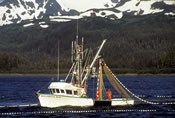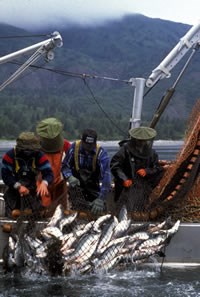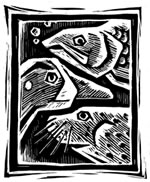
 Injury
Injury
Commercial fishing was injured as a result of the spill's direct impacts to commercial fish species (see individual resource accounts) and through subsequent emergency fishing closures. Fisheries for salmon, herring, crab, shrimp, rockfish and sablefish were closed in 1989 throughout Prince William Sound, Cook Inlet, the outer Kenai coast, Kodiak and the Alaska Peninsula. Shrimp and salmon commercial fisheries remained closed in parts of Prince William Sound through 1990.
Recovery Objective
Commercial fishing will have recovered when the commercially important fish species have recovered and opportunities to catch these species are not lost or reduced because of the effects of the Spill.
Recovery Status
In the 1994 Restoration Plan, the Trustee Council specifically recognized the declines in pink salmon and Pacific herring populations, and considered the reduction in these two fisheries as the biggest contributors to injury of the commercial fishing service in the Spill area. Therefore, many restoration activities were focused towards these resources. The strategy for restoring commercial fishing included funding projects that accelerated fish population recovery, protected and purchased important habitat and monitored recovery progress. By 2002, the Trustee Council considered pink salmon and sockeye salmon to be recovered from the Spill. However, recovery was not considered complete for Pacific herring and the recovery status of this resource remains "Not recovering" (see individual resource accounts).
 Income from commercial fishing dramatically declined immediately after the Spill, and for a variety of reasons, disruptions to income from commercial fishing continue today, as evidenced by changes in average earnings, ex-vessel prices and limited entry permit values. Natural variability in fish returns and a number of economic changes in the commercial fishing industry since 1989 probably mean that many of these changes in income are not directly attributable to the Spill. However, these factors also make discerning Spill-related impacts difficult. Economic changes confronting the industry include the increased world supply of salmon (due primarily to farmed salmonids) and corresponding reduced prices, entry restrictions in certain fisheries (such as Individual Fishing Quotas, for halibut and sablefish), allocation changes (e.g., a reduction in the allocation of Cook Inlet sockeye salmon to commercial fishermen), reduction in processing capacity, and spatial limitations of groundfish fisheries in the Spill areas in conjunction with sea lion management. Finally, competition among commercial, recreational, and subsistence fishers influence management decisions of these shared resources.
Income from commercial fishing dramatically declined immediately after the Spill, and for a variety of reasons, disruptions to income from commercial fishing continue today, as evidenced by changes in average earnings, ex-vessel prices and limited entry permit values. Natural variability in fish returns and a number of economic changes in the commercial fishing industry since 1989 probably mean that many of these changes in income are not directly attributable to the Spill. However, these factors also make discerning Spill-related impacts difficult. Economic changes confronting the industry include the increased world supply of salmon (due primarily to farmed salmonids) and corresponding reduced prices, entry restrictions in certain fisheries (such as Individual Fishing Quotas, for halibut and sablefish), allocation changes (e.g., a reduction in the allocation of Cook Inlet sockeye salmon to commercial fishermen), reduction in processing capacity, and spatial limitations of groundfish fisheries in the Spill areas in conjunction with sea lion management. Finally, competition among commercial, recreational, and subsistence fishers influence management decisions of these shared resources.
Since 1989, there have been no non-herring, Spill-related, district-wide fishery closures related to oil contamination, and populations of pink and sockeye salmon are considered recovered from the effects of the Spill. The Prince William Sound herring fishery has been closed for 15 of the 21 years since the Spill and herring are not considered recovered.
Commercial fishing, as a lost or reduced service, is considered to be RECOVERING from the effects of the Spill.
Click HERE for more information on Trustee Council funded studies involving commercial fishing.
